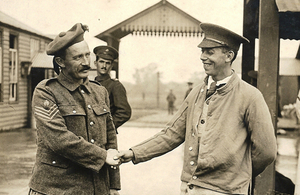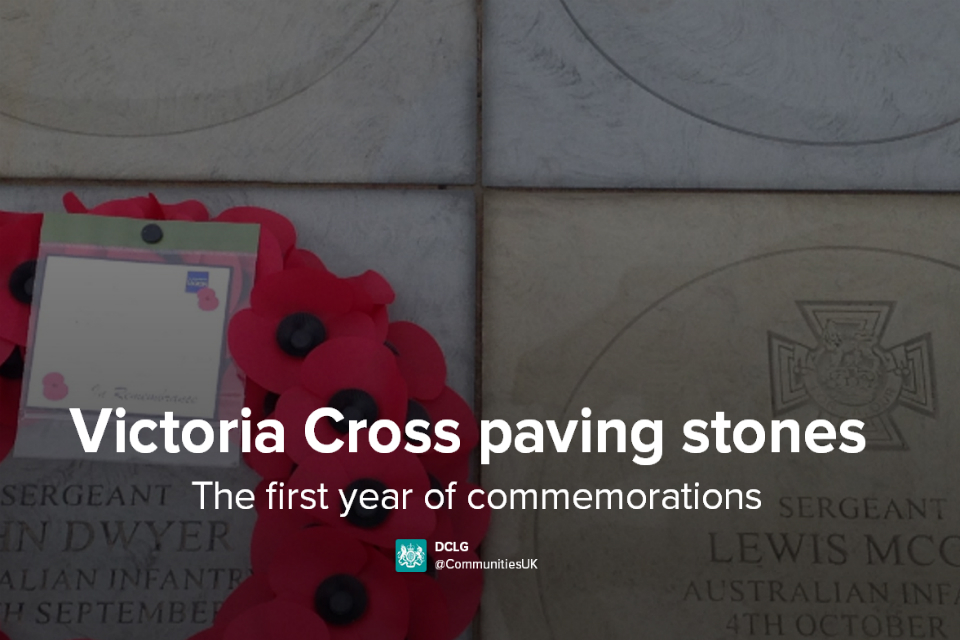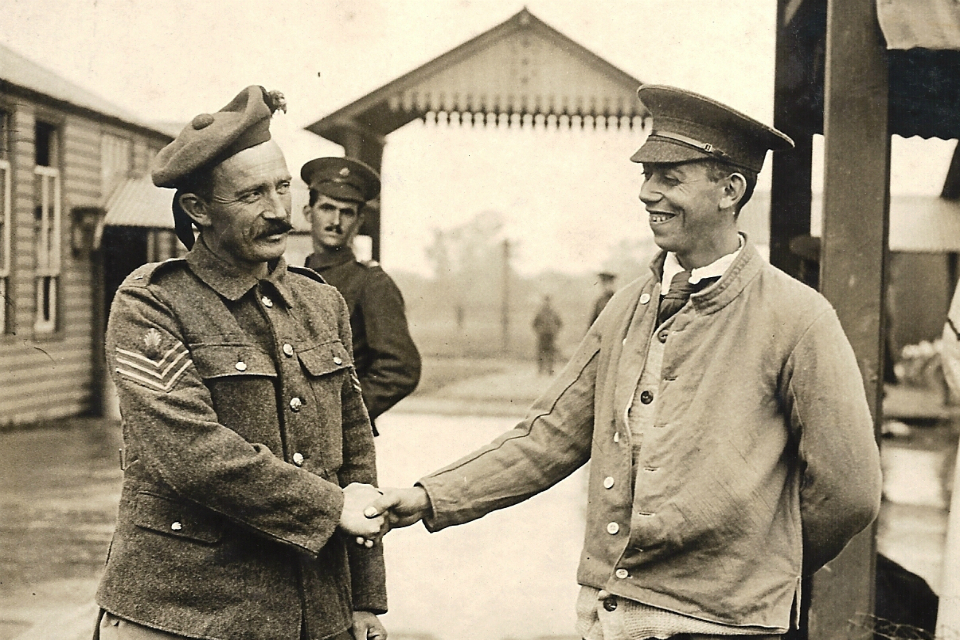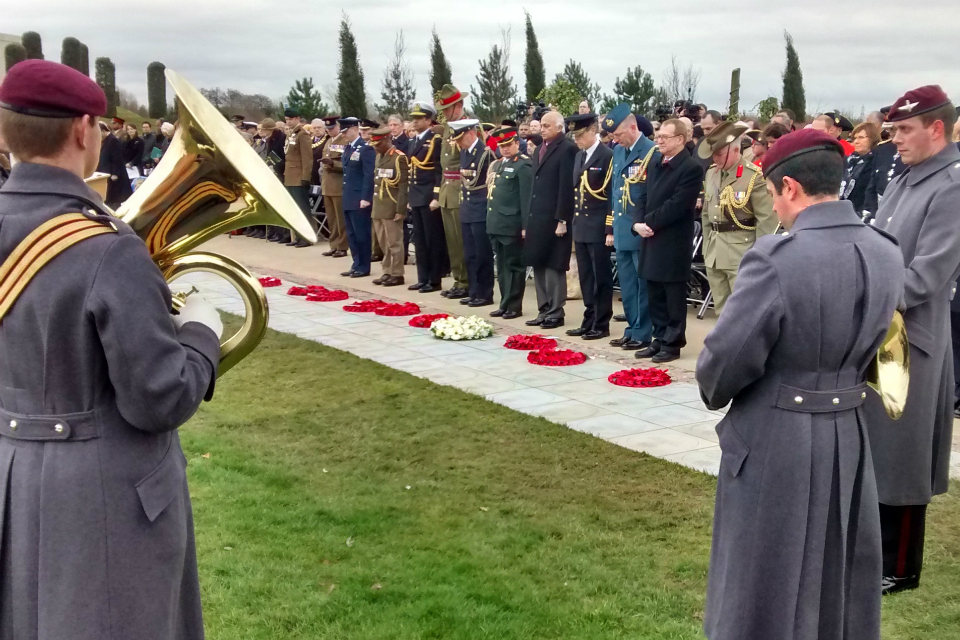Honour for Trooper Potts marks 1 year of VC paving stone ceremonies
Victoria Cross commemorative paving stone laid today in honour of Frederick Potts.

Fred Potts (right) shaking hands with his Enniskillin Fusilier rescuer.
Over the past year communities across the United Kingdom have been honouring local First World War heroes at Victoria Cross paving stone ceremonies, 100 years to the day they were awarded Britain’s highest military honour.
The commemorative stones - laid in the servicemen’s place of birth or where they lived following the war - provide a lasting legacy to their ‘most conspicuous bravery’. They also enable residents to gain a greater understanding of how their area and people of all backgrounds contributed to the history of the First World War.

Victoria Cross paving stones feature
Check out our feature to learn more about the Victoria Cross and the VC paving stones
One hundred years ago today Trooper Fred Potts VC, the ‘Hero with the Shovel’, was awarded the Victoria Cross for his exceptional courage at Gallipoli. The 22 year-old private saved Arthur Andrews a fellow member of the Berkshire Yeomanry.
His citation read:
On 21 August 1915 in the attack on Hill 70, Potts (although wounded in the thigh) remained for over 48 hours under the Turkish trenches with another private from his regiment who was severely wounded, and unable to move. He finally fixed a shovel to the equipment of his wounded comrade and using this as a sledge, dragged the man back over 600 yards to safety, being under fire all the way.

Fred Potts (right) shaking hands with his Enniskillin Fusilier rescuer.
Speaking ahead of today’s commemorative ceremony in Reading, Berkshire, Communities Minister Baroness Williams of Trafford said:
Over this past year local people have come together to honour and find out more about the men who fought and died for this country.
The stone laid today in honour of Frederick Owen Potts provides a lasting legacy to his bravery and will enable Reading residents to gain a greater understanding of how a local hero played a key role in the history of the First World War.
People of all backgrounds and faiths were recipients of the Victoria Cross all of whom carried out astonishing acts of valour in service of Britain. We all owe a huge debt to those brave heroes like Trooper Potts who served this country with such distinction.
Robert Binham, grandson of Fred Potts, said:
The commemorative VC paving stone to Trooper Potts VC will be unveiled at 5pm on 21 August, the centenary of the time orders to attack Scimitar Hill, Gallipoli were given and the centenary of the deed for which he was awarded the Victoria Cross.
Anne Ames, granddaughter of Fred Potts, said:
The Potts’ family are extremely proud that a local man has been so honoured.
Over a 4 year period, 469 stones are being laid in communities in England, Wales, Scotland and Northern Ireland. Thirty-five VC recipients are also being commemorated in the Republic of Ireland, with the first recipient Maurice Dease VC recognised at a ceremony in Dublin in August 2014.
Britain did not stand alone and the war effort was made up of people from every corner of the globe. The Prime Minister also paid tribute to the 145 servicemen born overseas, across 19 different countries, with the establishment of a permanent memorial at the National Memorial Arboretum.

The ceremony to commemorate overseas-born Victoria cross recipients at the National Memorial Arboretum in March 2015.
Further information
To find out more about the life of Trooper Potts work, see the Trooper Potts Memorial Trust website, Facebook page or Twitter.
See the dates of upcoming paving stone laying ceremonies.
Follow the laying of the commemorative stones on Twitter, #VCpavingstones.
See details of commemorative events to mark 100 years since Britain entered the First World War.
A public competition was held to choose a design for the paving stones and this was judged by a panel of 7 experts. The competition was won by Charlie MacKeith from London whose winning design will feature on all the paving stones that will be laid in communities across the country. The circular design seeks to ‘make one pause and remember’ and uses the material, form and lettering of the family of memorials used by the War Graves Commission.
The paving stones are made of Scoutmoor Yorkstone a hard-wearing British stone that is quarried near Ramsbottom. Each stone will include the name of the individual, the rank and regiment of the individual (at the time the VC was awarded) and the date of the action for which the VC was awarded.
The decision about the site of each stone has been taken by the relevant local authority. Guidelines to local authorities encouraged them to site the stones in a location that would have had resonance with the VC recipient, such as outside a house that they lived in or near their old school. Most importantly, the stones should be part of the community and sited in a position where they will be visible to members of the public.
Office address and general enquiries
2 Marsham StreetLondon
SW1P 4DF
Contact form https://www.gov.uk/gui...
General enquiries: please use this number if you are a member of the public 030 3444 0000
If your enquiry is related to COVID-19 please check our guidance page first before you contact us - https://www.gov.uk/guidance/coronavirus-covid-19-guidance-for-local-government.
If you still need to contact us please use the contact form above to get in touch, because of coronavirus (COVID-19). If you send it by post it will not receive a reply within normal timescale.
Media enquiries
Email newsdesk@communities.gov.uk
Please use this number if you are a journalist wishing to speak to Press Office 0303 444 1209